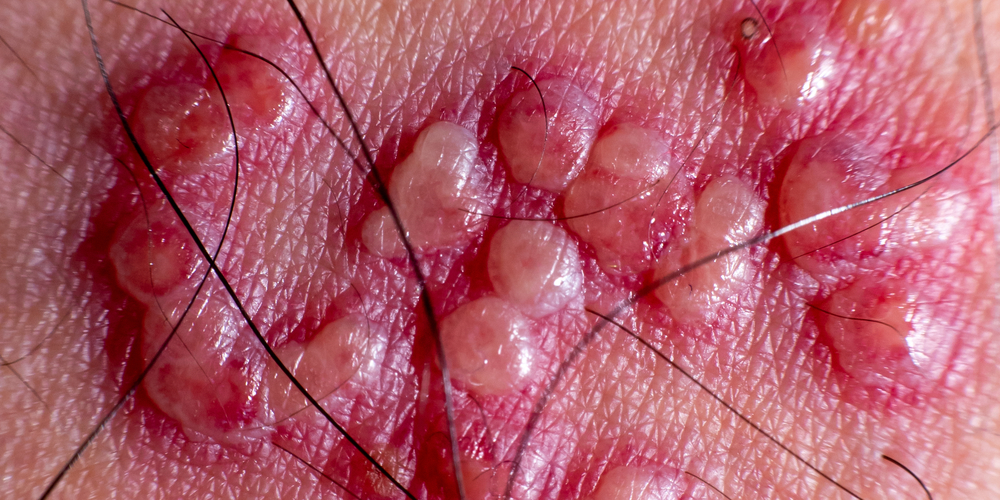Anal Herpes Explained: The STD No One Warns You About
Quick Answer Box
How to manage a herpes outbreak: Use antiviral medication like Valtrex to reduce the severity and duration, while also applying at-home remedies such as cold compresses, Epsom salt baths, and stress reduction. Early treatment matters, especially within the first 48 hours.
Herpes Outbreaks: What’s Really Going On?
A Herpes Simplex Virus outbreak isn’t random. It’s your immune system’s signal that the virus, usually dormant in your nerves, is back in action. There are two types, HSV-1 (often oral) and HSV-2 (mostly genital), but either can show up in either region.
An outbreak is usually triggered by stress, illness, hormonal shifts, or even friction from sex or clothing. First outbreaks hit harder, with painful sores, flu-like symptoms, and longer healing time. Recurrent outbreaks are often milder, but still a punch to your confidence.
Common outbreak symptoms include
- Tingling or burning before visible sores appear
- Clusters of fluid-filled blisters that burst and crust
- Swelling, itching, or pain in the affected area
- Fatigue or low fever, especially in first-time infections
The key? Learn your body’s warning signs and act early.
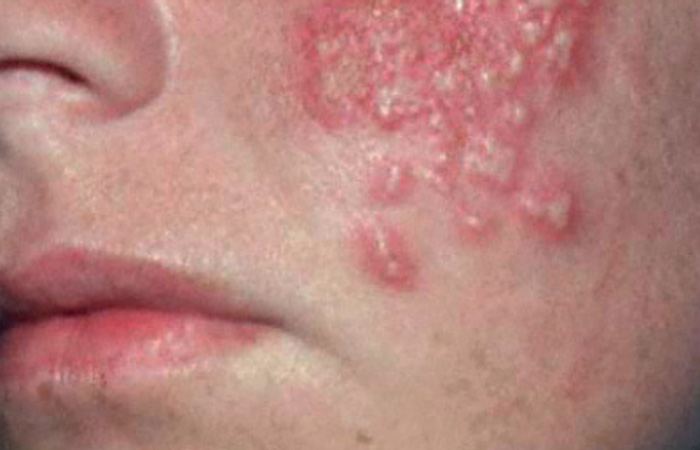
People are also looking for: Can you get herpes without having sex?
The Sooner, The Better: Medication That Works
Let’s be clear: antiviral meds aren’t just optional, they’re game changers. Prescription treatments like Valacyclovir (Valtrex), Acyclovir, and Famciclovir can:
- Shorten outbreak duration
- Lessen symptoms
- Reduce the chance of spreading the virus to partners
- Prevent future outbreaks when taken daily
Timing is everything. Start treatment as soon as you feel that first itch, tingle, or sting. If you wait until blisters appear, you’ve missed your window to truly reduce severity. Keep your meds on hand, especially if you have regular flare-ups.
Over-the-counter options? They won’t kill the virus, but topical anesthetics like lidocaine gel or even numbing sprays can provide temporary comfort. Just avoid anything fragranced or irritating near open sores. Get tested early with a discreet Herpes Home Test Kit, so you know exactly what you’re dealing with.
Ice, Salt, and Lysine: The Home Remedy Survival Kit
What helps between pill doses and crying into your pillow? Actual relief.
Tried-and-true home remedies
- Cold compresses: Wrap an ice pack in a soft towel and apply gently. This reduces swelling and numbs pain.
- Epsom salt baths: Add unscented Epsom salts to a warm bath. It soothes, dries out lesions, and gives much-needed comfort.
- Lysine supplements: Research shows that Lysine may inhibit viral replication. Look for 1,000mg daily, but ask your doctor before diving in.
- Cornstarch or zinc oxide: Lightly dusting sores can help keep them dry and reduce irritation.
- Loose clothing and breathable underwear: Let your skin breathe, moisture and friction are not your friends during a flare-up.
Avoid coconut oil, tea tree, or garlic unless specifically advised, they’re trendy online but can irritate broken skin.
Order Now $75.00 $98.00 Check Your STD Status in Minutes
Test at Home with Remedium
Genital & Oral Herpes Test Kit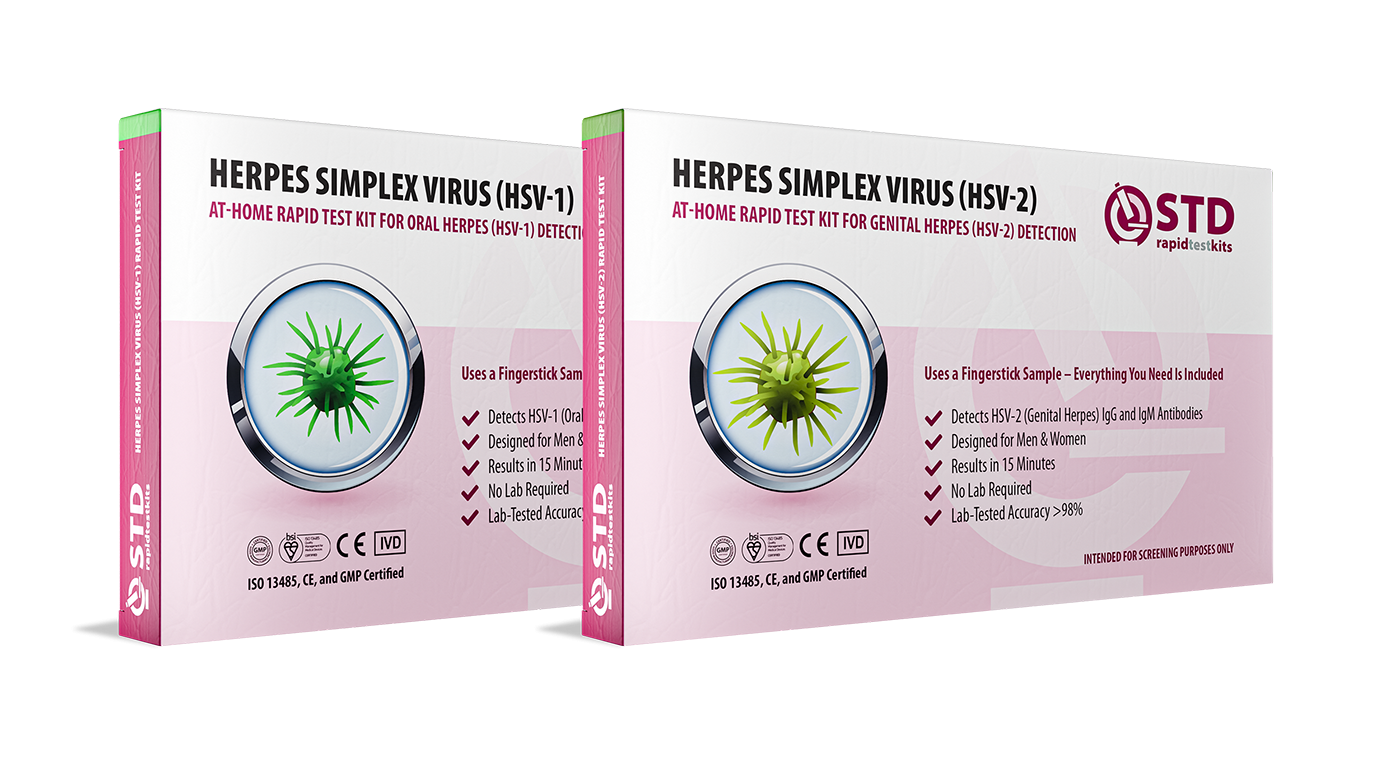




For all 2 tests
What Makes It Worse (So You Can Stop Doing That)
Herpes has a petty streak. Give it an inch, it’ll give you blisters.
Here’s what commonly triggers or worsens an outbreak
- Stress: Emotional burnout? Herpes loves that.
- Lack of sleep or poor diet: Weak immune system = open invitation.
- Friction during sex or masturbation: Even if you’re not contagious, skin irritation can ignite a flare.
- Trigger foods: Some people notice flare-ups with arginine-rich foods like chocolate, nuts, or caffeine.
- Harsh products: Perfumed soaps, bubble baths, and most drugstore “intimates” cleansers disrupt your skin’s barrier.
You don’t have to live like a monk, but learning your body’s patterns is the smartest kind of self-care.
Herpes & The Mind-Body Connection
Stress doesn’t just make your brain feel fried, it feeds herpes.
In one major study from the Journal of Psychosomatic Research, researchers found that stress-related immune suppression can directly lead to HSV-2 reactivation. Your nervous system plays a key role in outbreaks.
So no, you’re not “imagining it.” That fight with your ex, your job burnout, or exam anxiety? All valid reasons your outbreak is back.
What helps
- Deep breathing + mindfulness: Apps like Insight Timer or Headspace can lower cortisol fast.
- Regular exercise: Even walking 30 minutes a day can modulate immune function.
- Therapy or journaling: Processing emotions gives your nervous system a break.
Herpes isn’t just a skin condition. It’s a full-body, full-mind experience, and deserves holistic care.

People are also looking for: What if my partner says they’re clean?
Why It Feels Worse Than It Looks (And How to Reframe It)
Herpes doesn’t just hurt your skin, it hurts your self-image. You might feel dirty, dangerous, or like you’ve ruined your dating life forever. That’s not just stigma talking; it’s shame, and shame is a powerful immune suppressor.
But here's the kicker: Herpes is common, like, really common. Over two-thirds of adults have HSV-1, and at least 1 in 6 people in the U.S. carry HSV-2. So the next time you're spiraling, remember this: you're not gross, you're not rare, and you're definitely not alone.
One woman we interviewed, "Kendra", said her diagnosis felt like the end of her sex life. But once she learned to recognize her triggers and manage outbreaks, she stopped feeling helpless. “I started treating my body like a partner, not a problem,” she shared. Now, she dates with honesty, and doesn’t panic every time she feels a tingle.
This isn’t just a skin issue, it’s a boundary issue, a communication issue, and a self-trust issue. And all of those things? Are manageable.
Suppression: Living Without the Constant Fear of “When”
If your outbreaks are frequent or particularly rough, daily suppressive therapy might be your ticket back to peace of mind.
Suppressive therapy means taking antiviral medication, typically Valtrex or Acyclovir, every single day. The goal isn’t just to reduce how often you break out (though it does that), but also to lower your risk of spreading the virus to partners.
In one study, daily use of Valtrex reduced symptomatic outbreaks by nearly 80% in people who had frequent flare-ups. It also slashed the risk of transmission by half.
You don’t need to be having constant outbreaks to benefit from it. If herpes is causing mental health strain, disrupting your sex life, or making you hypervigilant, that alone might justify the daily dose. Talk to your provider about a long-term plan, because herpes management isn’t about “toughing it out.” It’s about choosing quality of life.
Order Now $149.00 $392.00 Check Your STD Status in Minutes
Test at Home with Remedium
8-in-1 STD Test Kit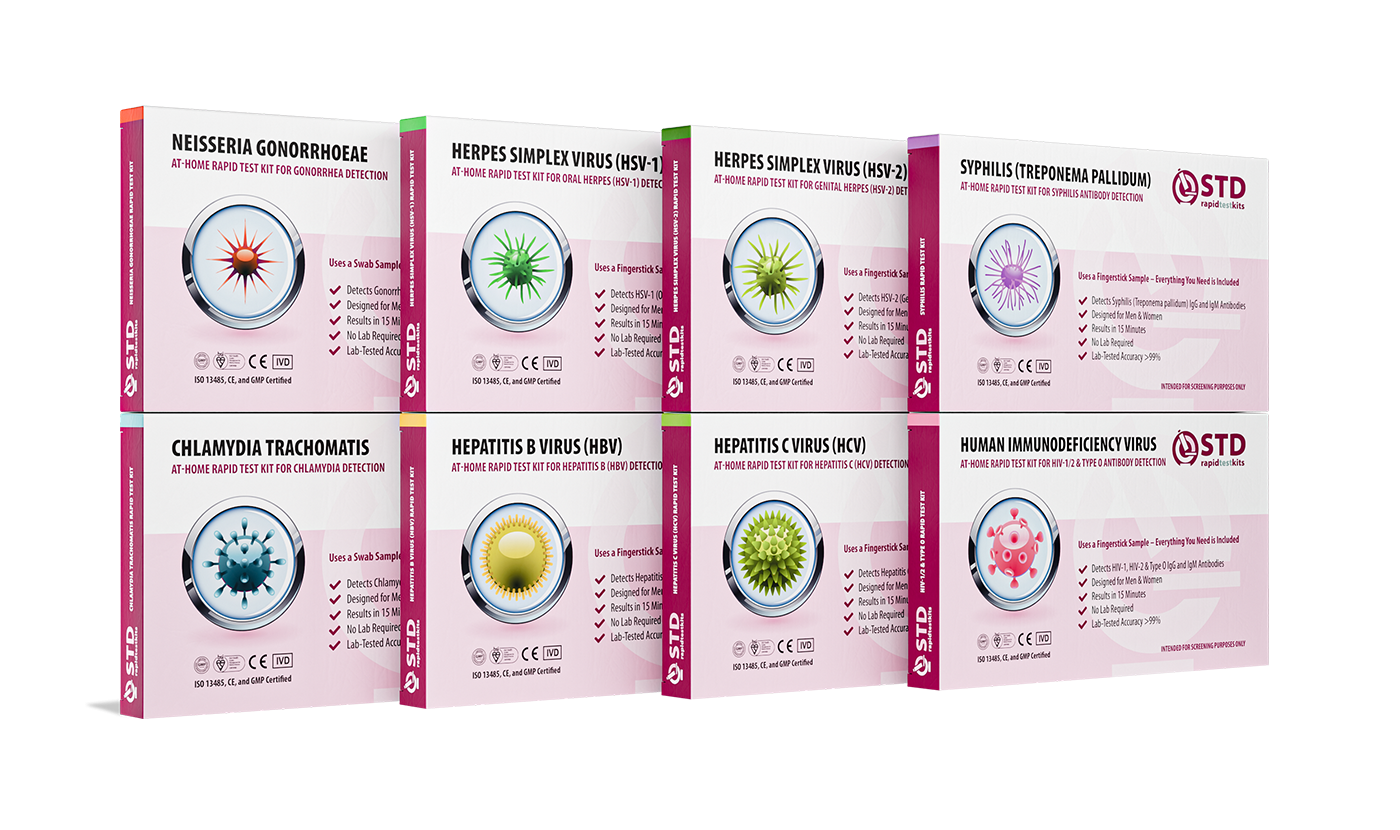




For all 8 tests
When to Test, and Why It Matters
If you’ve never had a formal diagnosis, or you’re not sure what’s causing your symptoms, testing is the best first move. Many people are misdiagnosed based on appearance alone, or mistake Herpes for things like ingrown hairs, razor burn, or fungal infections.
A Herpes Home Test Kit can confirm the presence of HSV-1 or HSV-2 with a simple blood test. Knowing which type you have helps guide treatment and sets expectations for future outbreaks.
You should test if:
- This is your first outbreak
- You’ve had unprotected sex recently
- You’re experiencing recurring symptoms but haven’t confirmed the cause
- A partner disclosed their status
Even if symptoms have faded, you can test. HSV antibodies remain detectable long after sores heal, giving you clarity when your body isn’t giving clear signals. Don't wait for “the right time.” Get tested discreetly from home and start managing herpes from a place of knowledge, not fear.
What the Data Really Says
Let’s cut through the rumors with hard facts. According to the CDC, about 1 in 2 Americans have HSV-1 by the time they reach adulthood. HSV-2, the virus most associated with genital herpes, is found in roughly 12% of people aged 14–49 in the U.S.
Women are biologically more susceptible than men, and many people infected don’t experience noticeable symptoms, or don’t recognize them when they happen. This is part of what makes herpes so stealthy and stigmatized: you might carry it for years before your first outbreak, or never have one at all.
Treatment doesn’t “cure” herpes, but studies show antiviral therapy can reduce outbreak frequency, healing time, and the chance of infecting a partner, especially when combined with safe sex practices.
Misconceptions That Deserve to Die
Let’s set some records straight.
No, herpes isn’t only spread when someone has visible sores. Yes, you can pass it even when you feel fine, that’s called asymptomatic shedding, and it’s one reason the virus spreads so widely.
No, it’s not always “the other person’s fault.” You could’ve picked it up years ago and only just now had your first outbreak. And no, having herpes doesn’t mean you’re doomed to a lonely, sexless life.
One of the most damaging myths? That you can’t be loved or trusted once you’re diagnosed. The truth: people date, marry, and raise families with herpes every single day. Disclosure takes guts, but herpes is not a relationship death sentence. It’s a test of empathy, not worth.
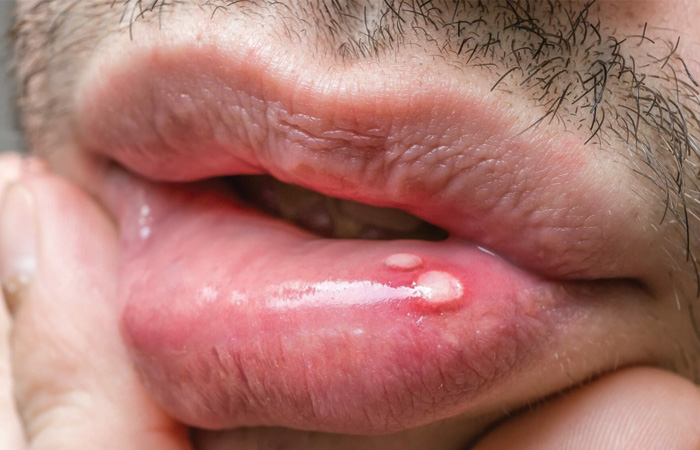
People are also looking for: Can I safely breastfeed if I have herpes?
FAQs
1. Can a herpes outbreak go away without treatment?
Yes, most outbreaks will resolve on their own within 1–2 weeks. But treatment can speed up healing and reduce pain.
2. What does the first herpes outbreak feel like?
Often described as the most intense, it may include blisters, body aches, fever, and swollen lymph nodes, like a flu with painful skin symptoms.
3. Can I use Vaseline or Neosporin on herpes sores?
Vaseline may soothe, but Neosporin is not recommended, it can irritate and doesn’t help heal viral infections.
4. How long does a herpes outbreak usually last?
Initial outbreaks can last 2–4 weeks. Recurrent ones typically resolve in 7–10 days, especially with antiviral medication.
5. Can you get herpes from oral sex?
Absolutely. HSV-1 is often transmitted via oral sex, causing genital herpes even if the person only has cold sores.
6. Is there a way to permanently get rid of herpes?
No cure exists yet, but antiviral meds can suppress symptoms and reduce transmission risk significantly.
7. Can I work out or go to the gym during an outbreak?
It depends. Light activity is fine, but avoid high-friction exercises and shared equipment that might irritate sores.
8. Should I tell my partner about my herpes?
Yes, ethical and legal guidelines recommend disclosure before sex. Many people handle it with grace and understanding.
9. Does herpes mean I have a weak immune system?
Not necessarily. Many healthy people carry herpes. However, illness, stress, or fatigue can trigger outbreaks.
10, Will I ever have a normal sex life again?
Yes, and you deserve one. Communication, treatment, and confidence make all the difference.
Herpes Doesn’t Get the Final Say, You Do
Herpes might be permanent, but the pain, confusion, and shame around it don’t have to be. With the right mix of medication, home care, and emotional resilience, you can manage outbreaks without letting them manage you. Your sex life isn’t over. Your confidence isn’t gone. You’re just learning a new language of self-care, and trust me, you're already fluent in more of it than you think.
If you’re in the thick of it right now, breathe. Relief is possible, and it’s closer than you think. Don’t wait for another surprise outbreak. Test at home, treat early, and get back to your life.
Sources
1. CDC: Genital Herpes – Detailed Fact Sheet
2. Mayo Clinic: Herpes Simplex Virus
3. Journal of Psychosomatic Research: Stress and HSV Reactivation






